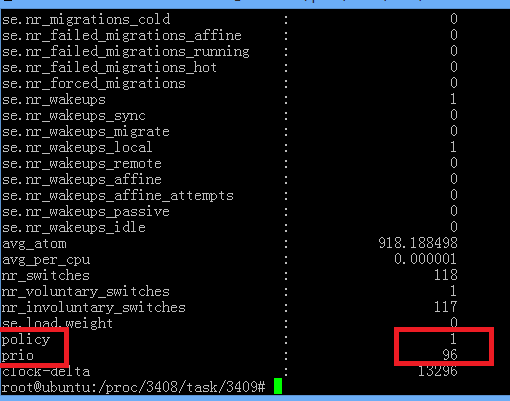当在属性对象中设置调度策略或优先级时,必须同时设置inheritsched属性(即继承属性设置为:PTHREAD_EXPLICIT_SCHED)。linux内核的三种调度方法:
- SCHED_OTHER 分时调度策略
- SCHED_FIFO实时调度策略,先到先服务
- SCHED_RR实时调度策略,时间片轮转
实时进程将得到优先调用,实时进程根据实时优先级决定调度权值,分时进程则通过nice和counter值决定权值,nice越小,counter越大,被调度的概率越大,也就是曾经使用了cpu最少的进程将会得到优先调度。
SHCED_RR和SCHED_FIFO的不同:当采用SHCED_RR策略的进程的时间片用完,系统将重新分配时间片,并置于就绪队列尾。放在队列尾保证了所有具有相同优先级的RR任务的调度公平。
SCHED_FIFO一旦占用cpu则一直运行。一直运行直到有更高优先级任务到达或自己放弃。如果有相同优先级的实时进程(根据优先级计算的调度权值是一样的)已经准备好,FIFO时必须等待该进程主动放弃后才可以运行这个优先级相同的任务。而RR可以让每个任务都执行一段时间。
int pthread_create(pthread_t *thread, const pthread_attr_t *attr, void *(*start_routine)(void*), void *arg); 来创建线程,但是如何设置线程的优先级呢? 在讨论这个问题的时候,我们先要确定当前线程使用的调度策略,posix提供了 int pthread_attr_getschedpolicy(const pthread_attr_t *attr, int *policy);
函数来获取所使用的调度策略,它们是:SCHED_FIFO, SCHED_RR 和 SCHED_OTHER。
我们可以使用: int sched_get_priority_max(int policy); int sched_get_priority_min(int policy); 来获取线程线程可是设置的最大和最小的优先级值,如果调用成功就返回最大和最小的优先级值,否则返回-1。 从我现在运行的linux系统中,我使用下列程序(程序见附录)获取了对应三种调度策略中的最大和最小优先级: policy = SCHED_OTHER Show current configuration of priority max_priority = 0 min_priority = 0 Show SCHED_FIFO of priority max_priority = 99 min_priority = 1 Show SCHED_RR of priority max_priority = 99 min_priority = 1 Show priority of current thread priority = 0 Set thread policy Set SCHED_FIFO policy policy = SCHED_FIFO Set SCHED_RR policy policy = SCHED_RR Restore current policy policy = SCHED_OTHER
我们可以看到SCHED_OTHER是不支持优先级使用的,而SCHED_FIFO和SCHED_RR支持优先级的使用,他们分别为1和99,数值越大优先级越高。 从上面的结果我们可以看出,如果程序控制线程的优先级,一般是用pthread_attr_getschedpolicy来获取系统使用的调度策略,如果是SCHED_OTHER的话,表明当前策略不支持线程优先级的使用,否则可以。当然所设定的优先级范围必须在最大和最小值之间。我们可以通过sched_get_priority_max和sched_get_priority_min来获取。
#include <stdio.h> #include <stdlib.h> #include <unistd.h> #include <pthread.h> #include <signal.h> #include <string.h> void * thr_fun(void *arg) { int policy, ret; struct sched_param param; //获取线程调度参数 ret = pthread_getschedparam(pthread_self(), &policy, ¶m); if(ret!=0) { printf("pthread_getschedparam %s\n", strerror(ret) ); exit(1); } if (policy == SCHED_FIFO) { printf("policy:SCHED_FIFO\n"); } else if (policy == SCHED_OTHER) { printf("policy:SCHED_OTHER\n"); } else if (policy == SCHED_RR) { printf("policy:SCHED_RR\n"); } printf("param: %d\n", param.sched_priority); printf("pthread getpid = %d\n",getpid()); long long i; while (1) { i++; i *= 2; } pthread_exit(NULL); } int main(int argc,char *argv[]) { int ret; pthread_t tid; pthread_attr_t attr; int policy, inher; struct sched_param param; //初始化线程属性 pthread_attr_init(&attr); //获取继承的调度策略 ret = pthread_attr_getinheritsched(&attr, &inher); if (ret!=0) { printf("pthread_attr_getinheritsched %s\n", strerror(ret)); exit(1); } if (inher == PTHREAD_EXPLICIT_SCHED) { printf("PTHREAD_EXPLICIT_SCHED\n"); } else if (inher == PTHREAD_INHERIT_SCHED) { printf("PTHREAD_INHERIT_SCHED\n"); inher = PTHREAD_EXPLICIT_SCHED; } //设置继承的调度策略 //必需设置inher的属性为 PTHREAD_EXPLICIT_SCHED,否则设置线程的优先级会被忽略 ret = pthread_attr_setinheritsched(&attr, inher); if (ret!=0) { printf("pthread_attr_setinheritsched %s\n", strerror(ret)); exit(1); } sleep(1); policy = SCHED_FIFO;//在Ubuntu10.04上需要root权限 //设置线程调度策略 ret = pthread_attr_setschedpolicy(&attr, policy); if (ret!=0) { printf(" pthread_attr_setschedpolicy%s\n", strerror(ret)); exit(1); } param.sched_priority = 3; //设置调度参数 ret = pthread_attr_setschedparam(&attr, ¶m); if (ret!=0) { printf(" pthread_attr_setschedparam %s\n", strerror(ret)); exit(1); } //创建线程 ret = pthread_create(&tid, &attr, thr_fun, NULL); if (ret!=0) { printf("pthread_create %s\n", strerror(ret)); exit(1); } printf("main getpid = %d\n",getpid()); sleep(5); while (1) { printf("hello world\n"); printf("getpid = %d\n",getpid()); } pthread_join(tid, NULL); pthread_exit(NULL); }
root@# top -H
Priority 3 FIFO [99-100-3=-4]???
root@:/proc/3408/task/3409# cat sched

实时进程优先级:
prio = MAX_RT_PRIO(100)– 1 – rt_priority(3)= 96;
policy:
0 SCHED_OTHER
1.SCHED_FIFO
2.SCHED_RR